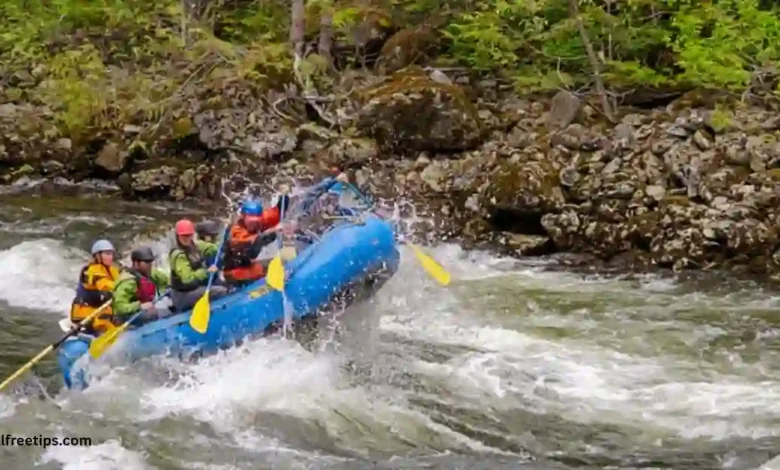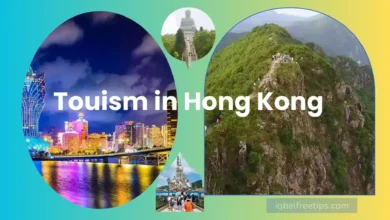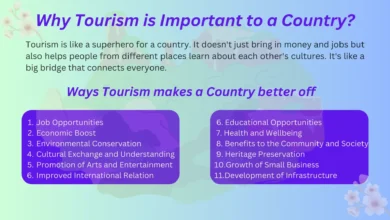
Recreational Tourism
Having fun while traveling is the main focus of recreational tourism. This kind of travel is your ticket to leisure and excitement, whether you’re going on a beach vacation, exploring a new culture, or going on an adventure. We’ll go over the fundamentals of recreational tourism in this article, as well as its significance and the amazing experiences it provides, which will make your next trip even more delightful.
What is Recreational Tourism?
Traveling for leisure, relaxation, and enjoyment is referred to as recreational tourism, often known as leisure tourism or just recreational travel. It is a type of tourism where travelers go to places, take part in activities, or enjoy different forms of entertainment and leisure to get away from their regular routines, unwind, and have fun.
Concept of Recreational Tourism
Recreational tourism means people travel during their free time to places where they can relax and recharge both physically and mentally. This idea applies to most types of tourism, but it’s opposite to business travel.
When people move around for work or to make money, it’s not considered recreational.
So, basically, the main purpose of tourism is to provide a break from our regular routines, allowing us to regain our energy. However, not all trips are equally relaxing. It also depends on where you go and what’s available there to help you relax. This is where we think about tourism not just as a way for people to enjoy themselves but also as a business.
Tourism is not just about the people who go on trips; it’s also about the people who organize those trips. They create what we call a “tourist product,” which includes everything from the natural beauty of a place to the things people build to make it a great destination.
In a nutshell, recreational tourism is about taking a break from everyday life to relax and recharge, and it involves both the travelers and the folks who make those trips possible.
Example of Recreational Tourism
Here are a few examples of recreational tourism.
- Beach Vacation
- Culture Exploration
- Adventure Travel
- Skiing Trip
- Theme Park Visit
- Wildlife Safaris
- Sporting Events
- Cruise Vacation
- Spa Retreat
- Wine and Culinary Tour
Beach Vacation
Travelers go to well-known beach locations like Cancun, Bali, or the Maldives to unwind on the white sand beaches, swim in the ocean, and engage in water activities like snorkeling, scuba diving, and jet skiing.
Culture Exploration
Travelers explore the museums, historical landmarks, and art galleries in cities like Rome, Paris, or Kyoto and get a taste of the local cuisine and culture.
Adventure Travel
Adventure seekers travel to locations like Costa Rica to zip line through the rainforest, Patagonia to hike and trek, and New Zealand to go bungee jumping and white-water rafting.
Skiing Trip
People travel to ski resorts in the winter to enjoy snowboarding, downhill skiing, and the après-ski scene in places like Aspen, Colorado, or the Swiss Alps.
Theme Park Visit
Theme parks with a variety of rides, shows, and entertainment are popular destinations for thrill-seekers and families, such as Tokyo Disney in Japan, Universal Studios in Florida, and Disneyland in California.
Wildlife Safaris
On safaris, people visit national parks in South Africa, Kenya, and India to view and photograph wildlife.
Sporting Events
Traveling to major athletic events, like the Olympics, Super Bowl, or FIFA World Cup, allows fans to witness their favorite athletes or teams compete.
Cruise Vacation
Cruise ship passengers take advantage of onboard facilities like excellent dining, entertainment, and swimming pools as they set out to see many places in a single voyage.
Spa Retreat
Travelers reserve vacations at spa resorts and health retreats in places like Sedona, Arizona, or Thailand so they can relax with massages, yoga, and meditation.
Wine and Culinary Tour
Visitors visit places like Tuscany in Italy, Napa Valley in California, and Bordeaux in France to sample the local cuisine and fine wines.
Importance of Recreational Tourism
Recreational travel has a significant effect on the worldwide tourism sector and offers a number of key advantages and contributions to travelers as well as the places they travel. Here are a few of the key reasons for the significance of recreational tourism.
- Culture Exchange
- Economic Impact
- Community Development
- Environmental Conservation
- Infrastructure Development
- Culture Heritage Preservation
- Health and Wellbeing
- Social Interaction
- Culture Appreciation
- Promotion of Local Products
- Exchange Knowledge and Ideas
Culture Exchange
Recreational travel encourages intercultural dialogue and comprehension. Travelers have the chance to learn about many cultures, customs, and tongues, promoting a sense of tolerance and global knowledge.
Economic Impact
The local and national economies are greatly influenced by leisure tourism. Spending on lodging, dining, transportation, and entertainment brings in money for the destinations. In a variety of industries, including hospitality, transportation, and retail, this cash sustains businesses and generates jobs.
Community Development
By creating jobs and revenue streams, tourism can improve the economic health of nearby towns. Thus, poverty may be lessened and locals’ general quality of life may be raised.
Environmental Conservation
Tourism for recreation that is responsible can support efforts to conserve the environment. The existence of tourists and the money they pay to enter parks, animal reserves, and natural regions frequently go towards maintaining and protecting these places.
Infrastructure Development
The necessity to accommodate tourists frequently drives the development of a region’s lodging, dining, and entertainment options, as well as other services that benefit both tourists and locals.
Culture Heritage Preservation
By helping to preserve and restore historical and cultural places, recreational tourism may help to make sure that they are kept intact for the enjoyment of future generations.
Health and Wellbeing
People can unwind, de-stress, and get away from their regular routines by engaging in recreational travel. These pauses support mental and general wellness.
Social Interaction
Traveling promotes networking and social engagement, which enables people to meet new people and make enduring memories with loved ones.
Culture Appreciation
Travelers get a more profound understanding of other people’s cultures and customs, which heightens their cultural sensitivity and broadens their perspective.
Promotion of Local Products
Visitors frequently look for regional products, food, and crafts, which can increase demand for these items and help regional producers and artists.
Exchange Knowledge and Ideas
In order to support local producers and artists, tourists frequently look for locally-made items, food, and crafts.
Conclusion
Traveling for pleasure is simply one benefit of recreational tourism, but it also serves as a spur for progress. In addition to promoting local economies, environmental preservation, and social well-being, it offers a chance for rest, excitement, and cultural inquiry.
You may like:




